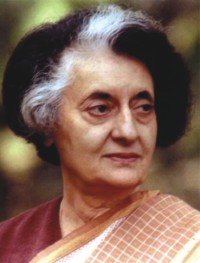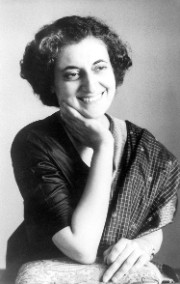Tribute
 Memories of Memories of
Indira Gandhi
Syed Badrul Ahsan
In November 1971, Richard Nixon and Henry Kissinger kept Indira Gandhi waiting in the White House for forty five minutes before they would deign to meet her. They were taking out their ire on the woman who had dared to cause trouble for their ally Pakistan, had indeed let the world know of the genocide the Pakistanis had been carrying out in occupied Bangladesh. For the American administration, India's prime minister was a huge roadblock to their grand plans of a realignment of global politics through China and Pakistan. Indira Gandhi, it concluded, did not deserve decent treatment.
The next day, it was Mrs. Gandhi's turn to have President Nixon call on her. She kept the United States president waiting for forty five minutes before she glided into the room, to greet him with a smile bordering on charm and sarcasm. It was not the first time that Indira Gandhi was careful about upholding her self-esteem. In 1966, a few months after taking charge as prime minister following the death of Lal Bahadur Shastri in Tashkent, she travelled to Washington to see President Lyndon B. Johnson. It was a bad time for India, with drought and food shortages placing it in the category of poor nations. Johnson was not nice to India's young leader. He was condescending and was happy lecturing her on the evils of poverty. Leaving the White House, Indira Gandhi vowed never to be humiliated by the leader of another country again. Once back in India, she embarked on the Green Revolution. It would leave India transformed. The country would not need food aid from the West again.
 In a very large sense, Indira Gandhi was symbolic of strong leadership, and that on a global scale. The young, beautiful woman derided as a chhokri, a mere slip of a girl, by Morarji Desai would go on to convince people everywhere that in her hands lay what it took to be an assertive leader. She would break the monopoly of the grandees of the Indian National Congress in 1969 by making sure that the man of her choice, Verahagiri Venkata Giri, was elected India's president. Her party split; and those who found themselves on the other side would go on to lose everything. She was keenly aware of the need to bring feudalism, even its vestiges, to an end. That was when she moved against the privy purses. She did not forget, not for a moment, that India's dignity was what mattered above all. She articulated that point in her speeches and in her action. In neighbouring Pakistan, generals and politicians cried hoarse about the threat they thought she was to their country. On his campaign swings in 1970, Zulfikar Ali Bhutto hurled, for no rhyme or reason, verbal abuse at India's prime minister. In 1971, General Yahya Khan, always outwitted by Mrs. Gandhi, referred to her with disrespect. To him she was a mere woman. In a very large sense, Indira Gandhi was symbolic of strong leadership, and that on a global scale. The young, beautiful woman derided as a chhokri, a mere slip of a girl, by Morarji Desai would go on to convince people everywhere that in her hands lay what it took to be an assertive leader. She would break the monopoly of the grandees of the Indian National Congress in 1969 by making sure that the man of her choice, Verahagiri Venkata Giri, was elected India's president. Her party split; and those who found themselves on the other side would go on to lose everything. She was keenly aware of the need to bring feudalism, even its vestiges, to an end. That was when she moved against the privy purses. She did not forget, not for a moment, that India's dignity was what mattered above all. She articulated that point in her speeches and in her action. In neighbouring Pakistan, generals and politicians cried hoarse about the threat they thought she was to their country. On his campaign swings in 1970, Zulfikar Ali Bhutto hurled, for no rhyme or reason, verbal abuse at India's prime minister. In 1971, General Yahya Khan, always outwitted by Mrs. Gandhi, referred to her with disrespect. To him she was a mere woman.
And yet Indira Gandhi did not hit back in the lowly manner they expected her to. On her forays abroad in 1971, she made it clear that Pakistan had to stop murdering its own people, that ten million Bengali refugees in India were a consequence of the murder and rape the Pakistan army had adopted as policy, that any solution to the crisis in Bangladesh depended on the freedom of its elected leader Sheikh Mujibur Rahman. She met Tajuddin Ahmed in Delhi in early April 1971 and made it plain to him that if the Bengali struggle for freedom was to be taken seriously, its politicians would need to give shape to a government. The upshot would be the provisional government in Mujibnagar.
Having defeated Pakistan in war, Indira Gandhi made sure that a process of peace be set in motion. When Bhutto, representing a vanquished Pakistan, arrived in Simla in 1972, he was disarmed by a graceful Indira Gandhi. Not once did she remind Bhutto that his country had lost the war, for it was her principle that those who emerged triumphant on the battlefield owed it to history to be magnanimous to those they had beaten hollow. She upbraided her officials when she discovered a photograph of herself in the suite that Bhutto was to occupy during the negotiations. She had the photograph removed. And she went out of her way to make sure that the young Benazir Bhutto had no reason to complain about her stay in Simla as her father engaged in talks with the woman he had always humiliated in his public remarks, the latest being his atrocious interview with the Italian journalist Oriana Fallaci.
In Indira Gandhi was the soul of a politician conscious of the lessons of history. She made mistakes, sure. But those mistakes were outweighed by the grit and wisdom she brought into her politics. Placing India under a state of emergency was a blunder and she paid for it heavily. When she lost the elections in 1977, her enemies, unable to rise to the heights of purposeful leadership, humiliated her at every turn. And they squabbled among themselves. In a mere three years, Indira Gandhi would rise from the ashes and go on to send the old, ineffectual men of the Janata government packing. In 1980, she was prime minister once again.
Twenty five years after her assassination, Indira Gandhi remains a formidable figure in history. She brought charm, intelligence and wide reading into her exercise of leadership. It was leadership that remains inimitable. Not many men, not many women have equalled her in the dimensions and depths of political wisdom. That is the tribute we pay her.
(Indira Gandhi, third prime minister of India, was assassinated on 31 October 1984).
Copyright
(R) thedailystar.net 2009 |
